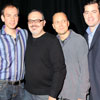Gaming retailer pitches new vision for stores
Gamer Doc looks to sell 20 franchise units this year
By Danny King -- Video Business, 4/10/2008
APRIL 10 | In a gaming industry where virtual worlds are attracting more people, one videogame retailer will try to also make the shopping experience a little more, well, virtual.
Gamer Doc stores will be designed with murals of such popular games as World of Warcraft.
New company Gamer Doc, founded late last year, is trying to sell enough franchises to open as many as 20 U.S. videogame stores this year. The company is pitching 800- to 1,200-square-foot stores designed to immerse the customer in popular games such as World of Warcraft by combining intricate wall murals of game scenes with a dozen or so plasma screens where shoppers may compete.
The company, whose founders are from the restaurant industry, hired Omaha, Neb.-based FHA Architects, which has built Blockbuster and KFC units among other retail chains, to design the stores, whose murals also might include store-specific local landmarks such as Seattle’s Space Needle and the Santa Monica Pier.
“We want to feature the games that are selling instead of having a mass of games up front,” said David Huether, chairman of Woodinville, Wash.-based Gamer Doc and former chief operating officer of Godfather’s Pizza. “Customers won’t have to paw through a bunch of games sitting on the rack.”
Gamer Doc enters a videogame retail market that, aside from the 5,200-unit GameStop, remains fragmented among electronics, movie-rental and general retailers, such as Best Buy, Blockbuster and Wal-Mart, despite booming industry sales. Last year, U.S. consumers bought $9.5 billion worth of videogames, up 28% from 2008, according to NPD Group. That jump is more pronounced among teens, who boosted videogame spending by 41% last year while cutting back in other areas such as compact discs, according to NPD.
Meanwhile, GameStop, whose average annual store revenue is approaching the $600,000 mark, said in February that fiscal fourth-quarter earnings surged 46%, while same-store sales jumped 25% last year.
With that in mind, Huether, who estimated opening costs at about $200,000 per store but declined to forecast revenue, is confident in his company’s financial model.
“There aren’t good franchise options out there,” said Huether. “Only 33% of households have a game console in them. That leaves lots of room for growth.”
Talkback
Related Content
Related Content
There are no other articles related to this article.
















